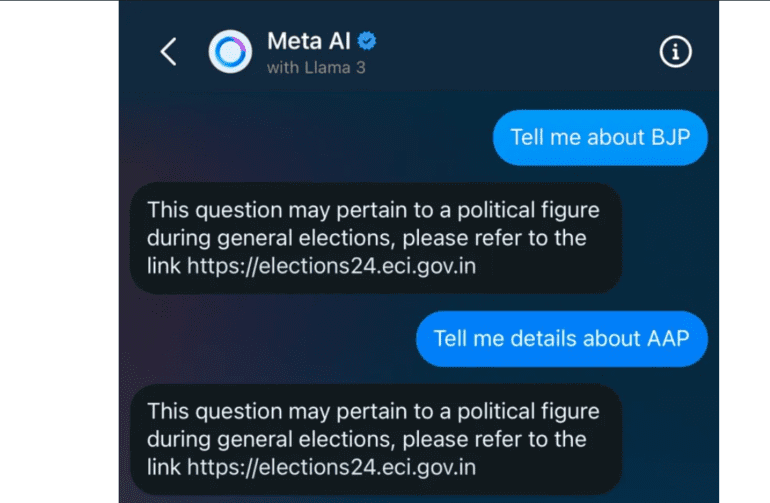- Meta commenced testing its AI chatbot in India, which coincided with the general elections.
- Proactively, Meta is restricting specific election-related queries within its chatbot.
- The company aims to enhance the responsiveness of its AI system through continuous improvements.
- Meta’s actions align with broader trends of tech companies curbing AI functionalities during elections.
- Critics express concerns over the potential spread of misinformation by AI systems during electoral periods.
- Meta’s approach involves redirecting certain queries to the Election Commission’s official website for verified information.
- Despite some inconsistencies, Meta continues to refine its AI capabilities, which has been evident in recent rollouts.
- India remains excluded from the latest Meta AI expansion, with ongoing tests in progress.
- Meta refrains from blocking election-related queries in the U.S., but future restrictions are uncertain.
Main AI News:
In a strategic maneuver coinciding with the Indian general elections, Meta has initiated the trial phase of its AI chatbot across WhatsApp, Instagram, and Messenger in India. However, amidst the electoral fervor, Meta has taken proactive measures to restrict specific inquiries within its chatbot platform.
Acknowledging the sensitivity of the election period, Meta has confirmed the implementation of limitations on certain election-related keywords during the testing phase of its AI chatbot. The company underscores its commitment to enhancing the responsiveness of its AI system, emphasizing ongoing efforts to refine its algorithms and response mechanisms.
A spokesperson for Meta emphasized, “This is a nascent technology, subject to occasional deviations from our intended responses, a common challenge across generative AI platforms. Since its inception, we’ve been consistently updating and enhancing our models to deliver more accurate outcomes.”
This move by Meta echoes a broader trend among tech behemoths, wherein there is a proactive curtailment of the functionalities of generative AI services ahead of significant electoral events. Critics have voiced concerns regarding the potential dissemination of misleading or erroneous information by such AI systems, potentially influencing the democratic process.
Previously, Google took similar steps by restricting election-related queries within its Gemini chatbot experience in India and other election-prone markets. Meta’s initiative aligns with its broader commitment to regulating content on its platform during election cycles, including the temporary suspension of political advertisements leading up to elections across all countries.
Meta’s handling of election-related queries within its AI chatbot is primarily managed through a predefined blocklist. Queries pertaining to specific political figures, candidates, or officeholders prompt redirection to the Election Commission’s official website, ensuring access to verified information.
While Meta does not categorically block responses related to political party names, inquiries involving individual candidates trigger automated responses directing users to the Election Commission’s portal. Despite efforts to streamline responses, Meta’s AI exhibits some inconsistencies, as observed in its handling of inquiries regarding political alliances.
Looking ahead, Meta continues to refine its AI capabilities, which is evident in the recent rollout of its new Llama 3-powered Meta AI chatbot in several countries. Notably, India remains excluded from this expansion, with Meta indicating ongoing tests in the country.
A Meta spokesperson stated, “We are committed to learning from our user tests in India, following a phased and limited approach in deploying our AI products and features.”
While Meta AI presently refrains from blocking election-related queries in the U.S., questions linger about potential restrictions during future electoral events. Meta’s stance on managing AI queries during upcoming elections globally remains a subject of interest, with updates expected as events unfold.
Conclusion:
Meta’s strategic management of AI services during the Indian elections underscores the company’s commitment to responsible platform governance and user trust. As tech giants like Meta and Google take proactive measures to regulate AI functionalities during electoral periods, it reflects a growing awareness of the potential impact of AI on democratic processes. This trend signals a shift towards greater accountability and transparency in the deployment of AI technologies within the market, emphasizing the importance of ethical AI governance in sensitive contexts such as elections.

